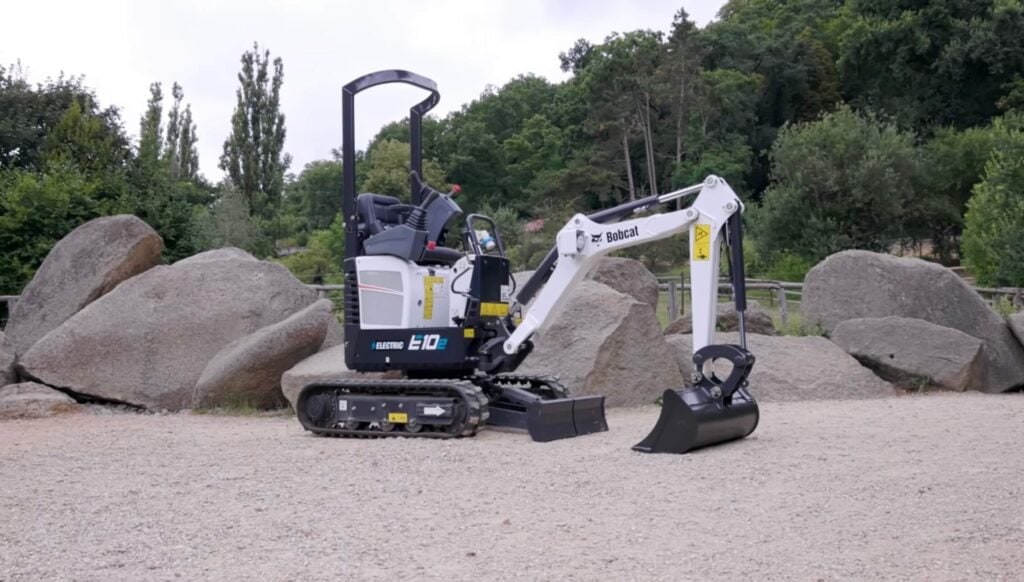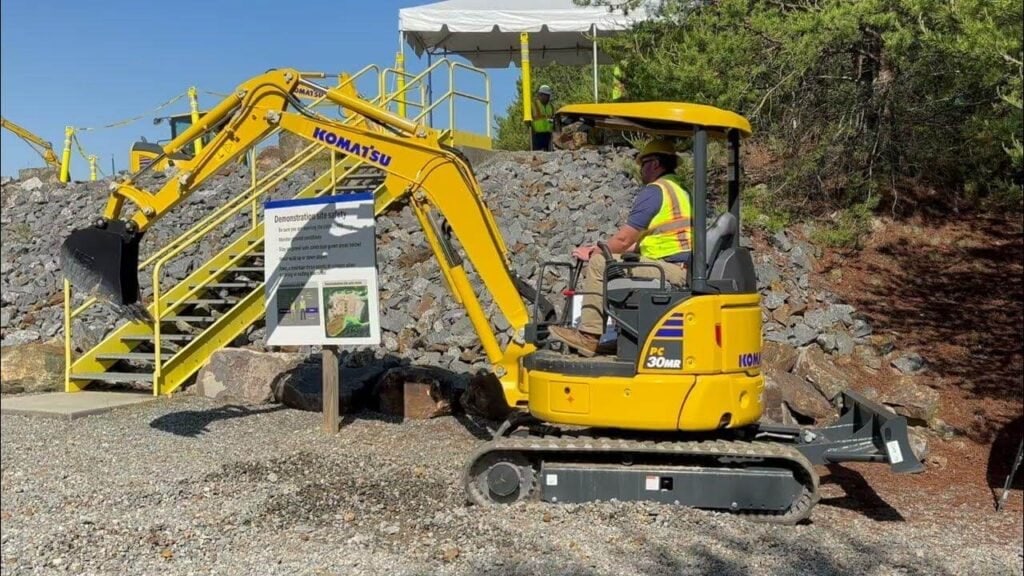Many customers overlook small excavators’ weight, resulting in hauling challenges and poor job performance. Let’s see how understanding your excavator micro weight can save you time and money.
A мини-экскаватор typically weighs between 1 and 6 tons. Lighter models like the 1 ton mini excavator work best for landscaping, while heavier ones like the CAT 305 mini excavator weight (about 5 tons) deliver deeper digging strength. Always match your mini excavator weight to your job size and transport capacity.
Let’s look at what influences mini excavator weight and how it affects your performance, transportation, and long-term expenditures.

What Factors Affect Mini Excavator Weight?
Each small excavator model varies in size and structure. The entire weight of a small excavator is determined by its frame, hydraulic system, and attachments. Understanding these aspects enables purchasers to prevent transportation concerns while also improving on-site stability.
Engine power, undercarriage type, boom size, and additional tools all have a significant impact on mini excavator weight. For example, the weight of a CAT 304 mini excavator differs from that of a Kubota mini excavator due to design and components.
The mini excavator weight chart clearly demonstrates how brand and model specifications influence total mass. The CAT mini excavator weight for the 304 series is approximately 4 tons, however the CAT 306 mini excavator weight is closer to 6 tons. The weight of a Kubota or Bobcat small excavator can range from 1.5 to 5 tons, depending on the attachments. Tracks also make a difference—steel mini excavator tracks are more durable but heavier, whereas rubber tracks lower overall small excavator weight.
Add-ons such as buckets, micro backhoe arms, and hydraulic breakers weigh hundreds of kg. That’s why knowing your small excavator’s weight in kilograms is critical before travel. Manufacturers such as CAT, Sany, and Kubota offer official micro excavator size charts. Always review these charts prior to purchasing or shipping. Accurate weight records guarantee that global exporters, such as numerous Chinese mini excavator providers, adhere to shipping and customs regulations.

Why Is Mini Excavator Weight Important For Buyers?
Buyers frequently misjudge how mini excavators’ weight capacity affects both task efficiency and operational costs. A heavier compact excavator provides better balance, but it may increase shipping costs.
The appropriate mini excavator weight increases fuel efficiency, task speed, and ground protection. Light micro excavator types cause less harm to fragile surfaces, whilst heavy-duty machines handle severe digging duties better.
Choosing a model with the appropriate mini excavator weight capacity promotes performance and safety. A one-ton micro excavator, for example, may go through restricted residential areas or indoor demolition sites. In contrast, heavier equipment, such as the CAT 308 excavator, offer greater stability for large-scale digging.
The greatest excavator for the money strikes a compromise between cost, mini excavator price new, and operating capacity. Many used mini excavators for sale options—particularly used excavators for sale by owner—provide excellent value provided the machine’s weight suits your project requirements.
Furthermore, mini excavator rental and hire firms frequently base their pricing on equipment weight. Lighter units result in reduced excavator rental costs, however larger equipment may have special mini excavator and trailer permits. Smart buyers always compare models of cat mini excavators for sale and JCB mini excavators for sale based on price-to-weight ratio. Remember that each additional ton affects gasoline, shipping, and maintenance expenses.

How To Choose The Right Mini Excavator Weight?
The best mini excavator size relies on your work kind, terrain, and budget. The proper weight ensures that your machine operates securely and efficiently.
Select a 1-2 ton mini excavator for gardening, 3-4 tons for construction, and 5-6 tons for excavation or demolition. Choose a mini excavator weight that is appropriate for your worksite and transportation vehicle.
When purchasing micro excavator models, consider where you will use them. Small spaces necessitate small units such as a walk-behind micro excavator or a temu mini excavator. Larger sites benefit from the greatest mini excavator models, such as the CAT 306 or Kubota mini excavators for sale.
A mini excavator weight chart will help you comprehend the trade-offs between mini excavators’ weight with trailer, digging power, and maneuverability. The top excavator brand (CAT, Кубота, or JCB) has precise specifications. For example, the 305 compact excavator weight is great for contractors who require portability without sacrificing power.
Understanding the weight of a Chinese mini excavator might assist exporters determine container loading. Whether you choose a Kubota mini excavator, a Bobcat small excavator, or a Sany mini excavator, make sure the model’s mini excavator weight in kg is within local transit regulations.

What Are The Transport And Cost Implications Of Mini Excavator Weight?
The logistics of operating a tiny excavator become increasingly difficult as its weight increases. Exporters and importers must consider shipping costs, permits, and equipment safety.
Heavy mini excavators have an impact on freight prices, loading equipment, and container selection. Proper weight documentation prevents customs delays and increased shipment fees.
A tiny excavator weight with trailer configuration necessitates corresponding vehicle capacity. For example, a tiny mini excavator for sale weighing roughly 2 tons can fit into a 20-foot container, whereas larger ones require 40-foot containers or flat racks.
Exporters from China, such as Hiosen Machinery, manage used mini excavators for sale logistics by balancing weight and shipping routes. Knowing the actual weight of a small excavator in kg helps to avoid unexpected costs. The difference in weight between a cat mini excavator and a bobcat mini excavator could result in hundreds of dollars in freight expenses.
Global customers could also examine excavator rental prices if importing appears to be too pricey. For short-term use, renting a compact excavator is often less expensive. Long-term projects, on the other hand, justify obtaining a robust model from reputable vendors who sell compact excavators.

What Size Truck Is Needed To Pull A Mini Excavator?
To transport your mini excavator securely, you’ll need the correct truck. Choosing an undersized car may result in accidents or fines. A truck rated for at least twice the weight of the small excavator provides safe towing. For example, a 3.5-ton truck may tow a 1.5-ton digger and trailer.
The mini excavator’s weight with trailer determines the overall towing capacity required. A mid-size pickup truck may be sufficient for a one-ton small excavator. However, for bigger units, such as the Cat 305 mini excavator weight, a medium-duty flatbed or a dedicated equipment transporter is required.
Always verify the local transportation restrictions. Many countries demand permits for shipping more than 3.5 tons. Using the small excavator size table and talking with cat mini excavator for sale vendors can help you estimate trailer load ratings.
Professional exporters in China frequently offer bundled transport services for used mini excavators for sale, guaranteeing that your mini excavator’s weight capacity satisfies all shipping safety requirements. Accurate documentation also reduces port inspection delays and additional handling fees.

What Is The Lifespan Of A Mini Excavator?
A well-maintained small excavator can last for over a decade. Lifespan is determined by brand quality, maintenance frequency, and employment conditions. Most small excavators survive 8-12 years, or 10,000-12,000 operating hours. Regular maintenance (oil, filters, and track inspections) prolong life and increases resale value.
The greatest mini excavator brands, such as CAT, Kubota, and JCB, build machines that last. However, even the best excavator brand loses efficiency when maintenance is neglected.
Daily checks of the мини-экскаватор tracks, hydraulic lines, and filters help to prevent malfunctions. Greasing joints and using genuine small excavator attachments might help reduce wear. Owners who adhere to regular maintenance regimens notice increased longevity and resale value, particularly in used excavators for sale by owner listings.
Exporters dealing with used mini excavators for sale should assure a complete service history. Machines with documented care usually outperform newer, but poorly maintained machines. So, whether you’re buying from a Chinese mini excavator provider or inspecting a temu mini excavator, always check the maintenance records before purchasing.

Краткое содержание
Understanding the weight of a mini excavator allows you to make better purchasing decisions, transport it safely, and work more efficiently. Contact us now to find the greatest excavator for the money.